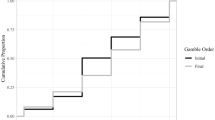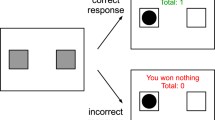Abstract
Violations of expected utility theory are sometimes attributed to imprecise preferences interacting with a lack of learning opportunity in the experimental laboratory. This paper reports an experimental test of whether a learning opportunity which engenders accurate probability assessments, by enhancing understanding of the meaning of stated probability information, causes anomalous behaviour to diminish. The data show that whilst in some cases expected utility maximising behaviour increases with the learning opportunity, so too do systematic violations. Therefore, there should be no presumption that anomalous behaviour under risk is transient and that discovered preferences will be appropriately described by expected utility theory.
Similar content being viewed by others
References
J.W. Alba H. Marmorstein (1987) ArticleTitleThe effects of frequency knowledge on consumer decision making Journal of Consumer Research 14 14–25 Occurrence Handle10.1086/209089
I. Bateman A. Munro B. Rhodes C. Starmer R. Sugden (1997) ArticleTitleDoes part-whole bias exist? An experimental investigation Economic Journal 107 322–331
G. Becker M. DeGroot J. Marschak (1964) ArticleTitleMeasuring utility by a single-response sequential method Behavioral Science 9 226–232
K. Binmore (1999) ArticleTitleWhy experiment in economics Economic Journal 109 F16–F24 Occurrence Handle10.1111/1468-0297.00399
Camerer, C. (1995), Individual decision making, in Kagel, J. H. and Roth, A. E. (eds.), The Handbook of Experimental Economics, Princeton University Press, Princeton.
Y. Chu R. Chu (1990) ArticleTitleThe subsidence of preference reversals in simplified and marketlike experimental settings: A note American Economic Review 80 902–911
J.C. Cox D.M. Grether (1996) ArticleTitleThe preference reversal phenomenon: Response mode, markets and incentives Economic Theory 7 381–405
R.P. Cubitt C. Starmer R. Sugden (2001) ArticleTitleDiscovered preferences and the experimentally observed violations of expected utility theory Journal of Economic Methodology 8 385–414 Occurrence Handle10.1080/13501780110103748
E. Diecidue P. Wakker (2001) ArticleTitleOn the intuition of rank-dependent expected utility Journal of Risk and Uncertainty 23 281–298 Occurrence Handle10.1023/A:1011877808366
H.J. Einhorn R.M. Hogarth (1978) ArticleTitleConfidence in judgment: Persistence in the illusion of validity Psychological Review 85 396–416 Occurrence Handle10.1037/0033-295X.85.5.395
W.K. Estes (1976a) ArticleTitleThe cognitive side of probability learning Psychological Review 83 37–64 Occurrence Handle10.1037/0033-295X.83.1.37
Estes, W. K. (1976b), Some functions of memory in probability learning and choice behavior, in Bower, G. H. (ed.), The Psychology of Learning and Motivation, Vol. 10. Academic Press, New York.
D. Friedman (1998) ArticleTitleMonty Hall’s three doors: Construction and deconstruction of a choice anomaly American Economic Review 88 933–946
D. Grether C. Plott (1979) ArticleTitleEconomic theory of choice and the preference reversal rhenomenon American Economic Review 69 623–638
G. Harrison (1994) ArticleTitleExpected utility and the experimentalists Empirical Economics 19 223–253 Occurrence Handle10.1007/BF01175873
C. Holt (1986) ArticleTitlePreference reversals and the independence axiom American Economic Review 76 508–515
S.J. Humphrey (1995) ArticleTitleEvent-splitting effects or regret-aversion: More evidence under risk and uncertainty Journal of Risk and Uncertainty 11 263–274 Occurrence Handle10.1007/BF01207789
S.J. Humphrey (1999) ArticleTitleProbability learning, event-splitting effects and the economic theory of choice Theory and Decision 46 51–78 Occurrence Handle10.1023/A:1004984621705
S.J. Humphrey (2001) ArticleTitleAre event-splitting effects actually boundary effects? Journal of Risk and Uncertainty 22 79–93 Occurrence Handle10.1023/A:1011105607742
S.J. Humphrey M. Bleaney (2006) ArticleTitleAn experimental test of generalized ambiguity aversion using lottery pricing tasks Theory and Decision 60 257–282 Occurrence Handle10.1007/s11238-005-4573-1
E.J. Johnson J. Hershey J. Meszaros H.. Kunreuther (1993) ArticleTitleFraming, probability distortions, and insurance decisions Journal of Risk and Uncertainty 7 35–51 Occurrence Handle10.1007/BF01065313
D. Kahneman A.: Tversky (1979) ArticleTitleProspect theory: An analysis of decision under risk Econometrica 47 263–291 Occurrence Handle10.2307/1914185
G. Loewenstein (1999) ArticleTitleExperimental economics from the vantage point of behavioural economics Economic Journal 109 F25–F34 Occurrence Handle10.1111/1468-0297.00400
G. Loomes (1999) ArticleTitleSome lessons from past experiments and challenges for the future Economic Journal 109 F35–F45 Occurrence Handle10.1111/1468-0297.00401
G. Loomes P. Moffatt R. Sugden (2002) ArticleTitleA microeconometric test of alternative stochastic theories of risky choice Journal of Risk and Uncertainty 24 103–130 Occurrence Handle10.1023/A:1014094209265
Plott, C. R.: (1996), Rational individual behaviour in markets and social choice processes: The discovered preference hypothesis, in Arrow, K. J., Colombatto, E., Perlman, M., and Schmidt, C. (eds.), The Rational Foundations of Economic Behaviour, MacMillan, Basingstoke.
U. Segal (1988) ArticleTitleDoes the preference reversal phenomenon necessarily contradict the independence axiom? American Economic Review 78 233–236
P. Slovic A. Tversky (1974) ArticleTitleWho accepts Savage’s axiom? Behavioral Science 19 368–373
V.L. Smith (1989) ArticleTitleTheory, experiment and economics Journal of Economic Perspectives 3 151–169
C. Starmer (1999a) ArticleTitleCycling with rules of thumb: An experimental test for a new form on non-transitive behaviour Theory and Decision 46 141–158 Occurrence Handle10.1023/A:1004930205037
C. Starmer (1999b) ArticleTitleExperimental economics: Hard science or wasteful tinkering? Economic Journal 109 F5–F15 Occurrence Handle10.1111/1468-0297.00398
C. Starmer R. Sugden (1993) ArticleTitleTesting for juxtaposition and event-splitting effects Journal of Risk and Uncertainty 6 235–254 Occurrence Handle10.1007/BF01072613
A. Tversky D. Kahneman (1992) ArticleTitleAdvances in prospect theory: A cumulative representation of uncertainty Journal of Risk and Uncertainty 5 291–323 Occurrence Handle10.1007/BF00122574
A. Tversky D.J. Koehler (1994) ArticleTitleSupport theory A nonextensional representation of subjective probability. Psychological Review 101 547–567
A. Tversky P. Slovic D. Kahneman (1990) ArticleTitleThe causes of preference reversal American Economic Review 80 204–217
M. Weber F. Eisenführ D. Winterfeldt Particlevon (1988) ArticleTitleThe effects of splitting attributes on weights in multiattribute utility measurement Management Science 34 431–445 Occurrence Handle10.1287/mnsc.34.4.431
G. Wu R. Gonzalez (1998) ArticleTitleCommon consequence conditions in decision making under risk Journal of Risk and Uncertainty 16 95–115 Occurrence Handle10.1023/A:1007714509322
Author information
Authors and Affiliations
Corresponding author
Rights and permissions
About this article
Cite this article
Humphrey, S.J. Does Learning Diminish Violations of Independence, Coalescing and Monotonicity?. Theor Decis 61, 93–128 (2006). https://doi.org/10.1007/s11238-006-8047-x
Issue Date:
DOI: https://doi.org/10.1007/s11238-006-8047-x




